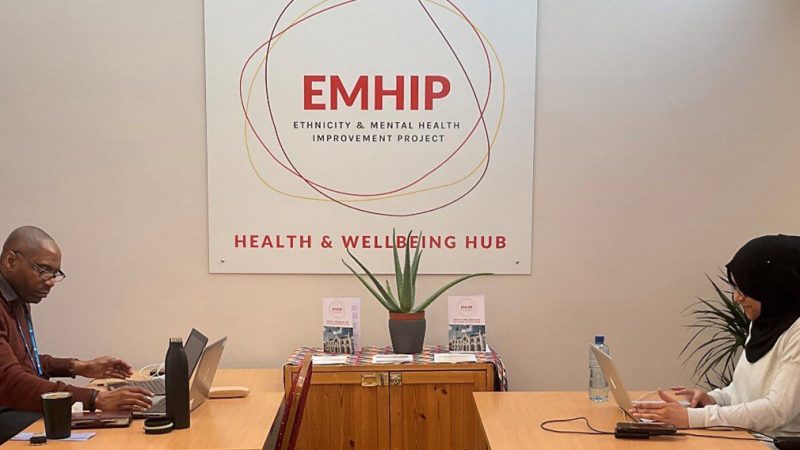Churches and places of worship are at the heart of their communities, offering people a place of solace and comfort. This is particularly true of the New Testament Assembly Church in Tooting, which now houses mental health support services, designed by and for the community they serve.
The Tooting mental health and well-being hub feels very different from traditional care. For mental health worker Antonia Buamah, who is based there it is a “godsend, a space where anyone can come and get help if they want to or just sit and talk”.
The hub is part of a wider project, which is reforming the landscape of mental health and wellbeing in Wandsworth. The Ethnicity and Mental Health Improvement Project (EMHIP) follows decades of campaigning by the Wandsworth community, and was developed in partnership with South West London and St George’s Mental Health Trust and South West London Integrated Care System.
A space for conversations about life’s challenges
The idea is to care for people who aren’t accessing services through traditional NHS routes. It offers a space for conversations about life’s challenges; where people can identify the support tailored to their needs. In keeping with the hospitable nature of the hub, service users are referred to as guests.
Malik Gul, Director of Wandsworth Community Empowerment Network, and writer and academic, Dr Colin King, have led the campaign for these changes. They believe the project’s ethos, strategy and delivery are uniquely informed by the lives, experiences and struggles of the people it serves.
For Malik, more than ever before, black and ethnic minority communities are demanding a change in mental health services. “At the moment, black and ethnic minority people are over-represented, over-medicated, over-policed, and over-restrained when experiencing mental health challenges,” he said.
EMHIP builds on existing community led co-produced projects
“Black people are more than four times more likely to be subject to restrictive practices[1]. And there are many more examples of preventable deaths among people from black and ethnic minority backgrounds, due to failures in the system.
“EMHIP was developed through the leadership and activism of people from black and ethnic minority communities. It offers and demands mental health service improvement led by local communities, co-designed and based on established lived-experience evidence. It builds on existing community led co-produced projects.”
EMHIP was developed through the leadership and activism of people from black and ethnic minority communities.
Malik Gul, Director of Wandsworth Community Empowerment Network
There are health inequalities in access to mental health support and treatment too. A recent study[2] found that black and ethnic minority groups were less likely to refer themselves for talking therapies, or to be referred by a GP. Even when people are referred, they are less likely to receive treatment.
The services the hub offers are wide ranging. They include mental health and well-being clinics; diabetes checks; smoking cessation and weight management sessions; couple and family support. It also provides advice on debt, housing, welfare benefits and soon drugs and alcohol dependency. Rather than moving the location of existing services, this hub is about creating completely new ones, which are culturally adapted, as well as offering a bridge to other NHS and community services.
Empowering members of the community
The work is also about empowering and offering training to members of the community in having conversations about health and well-being. Known as ‘community embedded workers’, they encourage people to access the hub and can be anyone with a local role – church pastors, or Imams, or local hairdressers and barbers, for example.
Even during the pandemic, the hub supported people who might not have received help otherwise. GPs refer to the service and it has already held multiple clinics. It hosted its first mental health outpatient clinic with a psychiatrist in April, and with the lifting of COVID restrictions, began welcoming more guests.
EMHIP’s second year in Wandsworth saw the introduction of more new initiatives. Elements of the plan are set out in the Emhip key intervention report. These are:
1. More varied and culturally appropriate services
- Expanding the choice for people experiencing crisis: through introducing Crisis Family Placement Service, providing the opportunity for people to be supported in the community and avoiding unnecessary inpatient admission.
- Better support for people with serious mental illnesses, including targeted and tailored interventions, particularly for young black men.
2. Reducing restrictive practice
- Including patients in decisions made about their own care through the introduction of shared decision making practices to reduce restrictive and coercive practices
- Ensuring compliance to the new Seni’s Law which seeks to restrict and regulate the use of restraint, control and force in mental health settings
3. Improving the inpatient experience
- Expanding the access that local communities have in the care and support for people in inpatient care, helping to maintain connections and familiarity with local community assets and support.
4. Develop culturally capable workforce
- The development of a training package informed by the lived experience of using our services in Wandsworth and wider SWL to ensure that every employee of the NHS has awareness and the skills to support and care for everyone in our community with dignity and respect.
[1] 89.2 black background versus 20.8 white background per 100,000 population, NHS Digital Mental Health Bulletin 2020-21
[2] Tackling Inequalities and Discrimination Experiences in health Services (TIDES) – Racial and ethnic differences in accessing NHS talking therapies – included in NHS Race and Observatory report – Ethnic Inequalities in Healthcare: A Rapid Evidence Review
